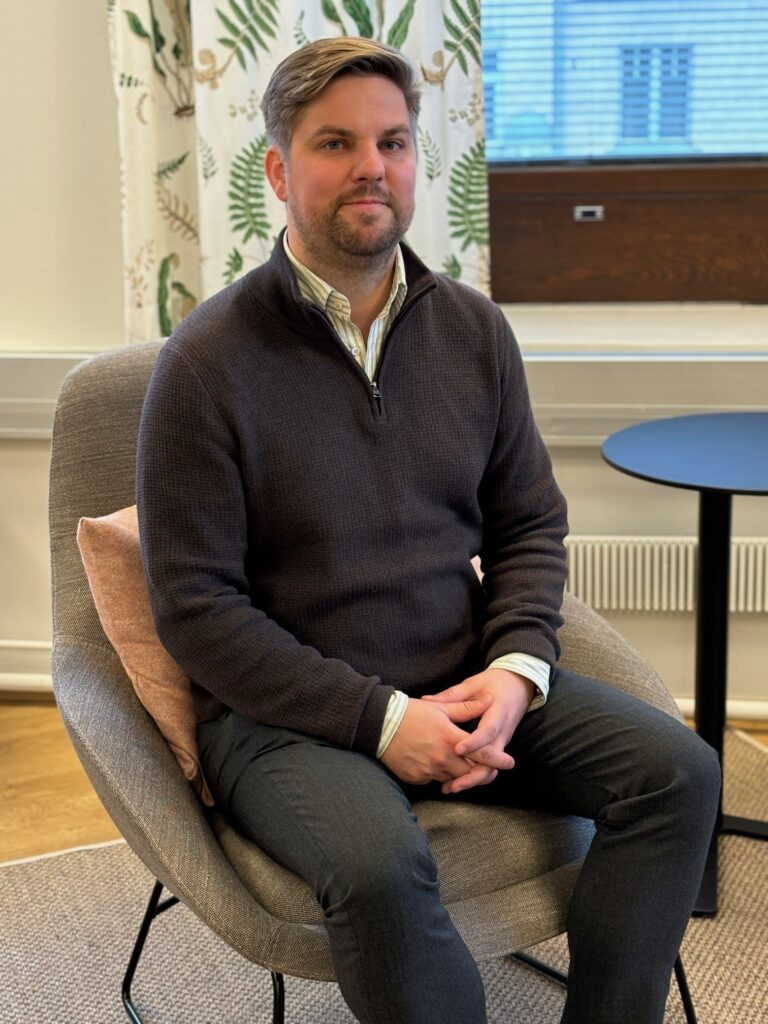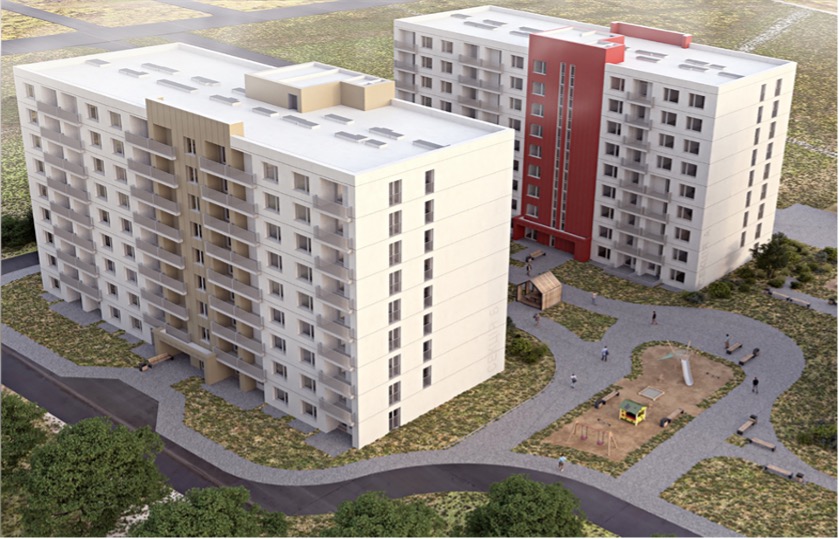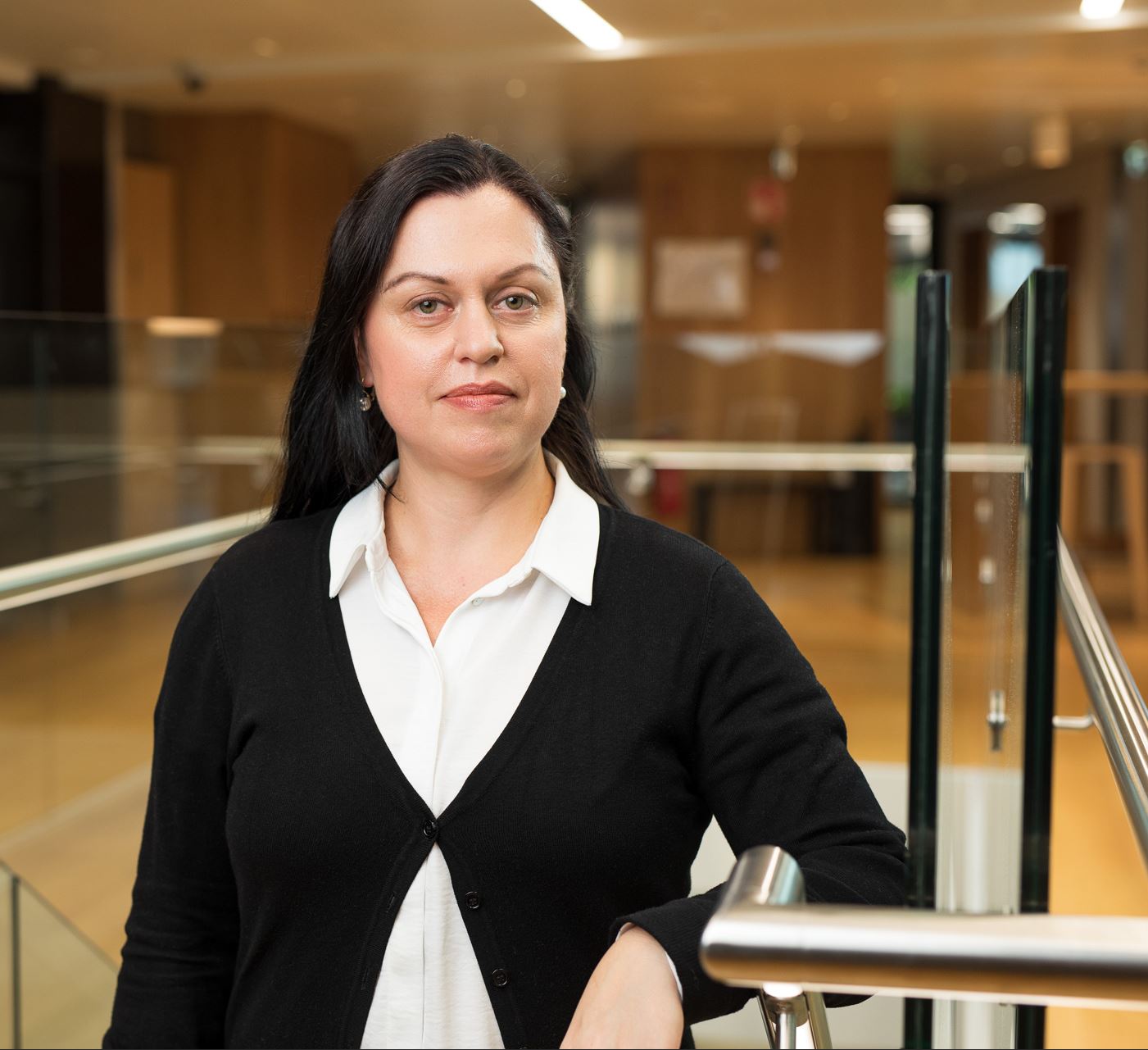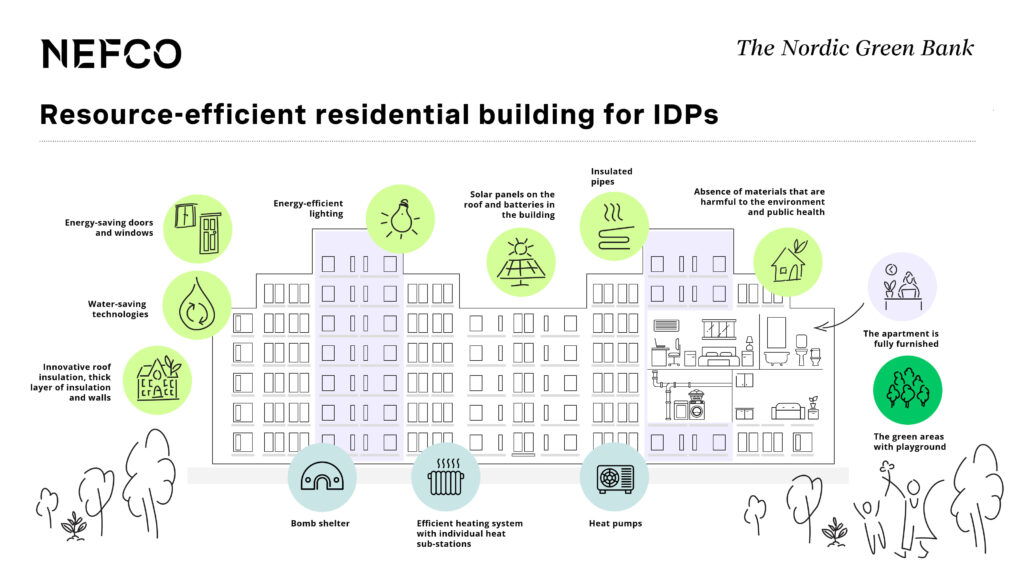09.10.2024 | Insight
On 23 June 2022, the European Council granted Ukraine candidate country status, as the latter expressed a strong desire to link reconstruction with reforms on its European path. In this process, Ukraine’s state authorities are also expected to play a key role in facilitating and supporting these reforms, including updating outdated Soviet-era building standards.
Читати історію українською мовою
- Nefco manages the preparation, procurement, contracting, implementation, and monitoring of three programmes focused on building accommodation for internally displaced persons (IDPs) in Ukraine. These programmes are financed by the European Union (EU) through grants.
- The primary objective is to provide decent and dignified living conditions for IDPs, which is considered an essential part of building a sovereign, independent, democratic, and legal state in Ukraine.
- Nefco believes Ukraine can align with the latest global technological advancements by introducing forward-looking reforms. This will not only modernise its infrastructure but also contribute to its broader development and integration with Europe.
Meanwhile, new sustainable materials, technologies, and innovative design approaches are continuously being developed globally. Despite this, Ukrainian authorities, in some cases, still mandate the use of conventional typical designs and traditional building materials and equipment. We at Nefco believe Ukraine can align with the latest global technological advancements by introducing forward-looking reforms. This will not only modernise its infrastructure but also contribute to its broader development and integration with Europe.
Contributing to Ukraine’s green, resilient and equitable recovery

Main responsibility
Oversees the implementation of “Housing for Internally Displaced Persons, and Rehabilitation of Liberated Cities in Ukraine, Component II” and other EU-financed programmes
Experience
Over 10 years of management and implementation of public sector projects, mainly in the municipal water, wastewater and solid waste management sectors, in Ukraine and other post-Soviet countries
Motivation
I want to contribute to providing the most vulnerable Ukrainians with a comfortable, long-term accommodation solution and a fair opportunity to start rebuilding their lives.
“These programmes are crucial for setting a new standard for housing in Ukraine, as they demonstrate how sustainable construction can provide comfort, be green, and be cost-efficient,” says Henrik Toremark, Senior Programme Manager at Nefco.
“Aside from applying a holistic approach to energy efficiency, these programmes also integrate renewable electricity generation such as solar panels and use water-saving technologies, which are all in line with the EU’s construction standards,” adds Andriy Katashov, Technical Adviser at Nefco.
“This approach not only ensures lower operational costs compared to typical residential buildings in Ukraine but also aligns with global efforts to combat climate change by reducing CO2 emissions. Adopting such standards will contribute to Ukraine’s green, resilient and equitable recovery, and prepare the country for EU accession,” explains Julia Shevchuk, Chief Investment Adviser at Nefco.
Nefco currently manages nine projects focused on the construction of housing for IDPs, who have experienced disproportionate suffering as a result of the military operations. Another ten projects are dedicated to the reconstruction of existing buildings to accommodate IDPs. In total, the projects are expected to house 5,241 IDPs in Northern and Western Ukraine.
Here, Henrik and Julia highlight examples from “Housing for Internally Displaced Persons, and Rehabilitation of Liberated Cities in Ukraine, Component II,” one of three EU-funded programmes, and answer frequently asked questions about Nefco’s role in supporting this construction effort.
Programme overview and management
Which cities are set to benefit from this specific programme?
The programme includes nine new residential buildings in Ivano-Frankivsk, Khmelnytskyi, Novovolynsk, and Ternopil. These buildings will accommodate 1,176 IDPs across 578 apartments. The first residents are expected to move in by autumn 2025. The programme also includes the reconstruction of a hospital building in Nemishaeve, which serves both local residents and IDPs.
How much is the total investment?
The total investment is EUR 34.5 million, with the projects currently in the contracting and implementation stages.
Innovative features and environmental considerations
What are some of the innovative features of these buildings?
The design of the buildings was developed in accordance with the State Construction Norms’ energy efficiency category C, but it was modified to ensure comfortable conditions and demonstrate new technical solutions within the Ukrainian context. To reduce heat consumption, the building envelope is designed with a thicker layer of insulation and walls, an innovative roof insulation, and doors and windows with lower heat losses than those stipulated in the State Construction Norms. As a result, the energy performance will be in line with the State Construction Norms’ energy efficiency category B.

Moreover, each building is constructed with:
- solar panels with a 15kW capacity and batteries with a 10kWh capacity to ensure continuous electricity supply;
- heat pumps for hot water consumption and high-efficiency water fixtures in bathrooms and kitchens. Energy from solar panels will be used to provide electricity to public areas and critical engineering equipment;
- an absence of materials that are harmful to the environment and public health, such as asbestos and fluorine gases. Unfortunately, these materials are still widely used in Ukraine.

Main responsibility
Head of the Representative Office of Nefco in Ukraine, responsible for several municipal infrastructure projects in the country
Experience
Over 20 years’ experience in infrastructure project development across various sectors, including the delivery of large programmes for the public sector, focusing on procurement and financing in water, district heating, public buildings, and renewable energy in Ukraine
Motivation
The desire to contribute directly to the reconstruction of my homeland, especially during the war, is a significant motivating factor. My work at Nefco has created a powerful combination of personal fulfillment, national duty, and professional opportunity, driving me to engage in these essential recovery efforts.
How does the accommodation compare to typical Ukrainian residential buildings in terms of energy efficiency?
All in all, the approach is estimated to result in an annual average heat consumption of 58 kWh per m2, which is 64% lower than in typical Ukrainian residential buildings. This means that a municipal resident can significantly reduce their heating costs. This will have a significant positive impact on operational costs and contribute to a reduction in CO2 emissions by 1,000 tonnes annually.
Are the buildings certified for any environmental standards?
Yes, Nefco is piloting the certification of two buildings in the Khmelnytskyi project under the “Excellence in Design for Greater Efficiencies” (EDGE) Certification Scheme. This certification requires a minimum 20% reduction in energy, water, and materials compared to conventional buildings. EDGE was developed by the International Finance Corporation (IFC) to facilitate design and certification of resource-efficient buildings worldwide.
Cost and allocation
Why is the unit cost of construction higher than the recommended amount?
The average unit cost is EUR 1,233 per m2, higher than the recommendation of EUR 432–463 (UAH 19,960-21,363 per m2) set by the Ministry for Communities, Territories, and Infrastructure Development of Ukraine. The higher cost is due to additional features such as engineering systems, solar panels, and interior and exterior amenities.
The recommended construction norms, many of which were established during the Soviet era, often mandate dormitory-style housing with limited amenities. Our programme focuses on providing the Ukrainian population with modern housing that ensures decent living conditions.
How will the accommodation be allocated to IDPs?
The accommodation will be allocated based on Ukraine’s Government Resolution No. 495, dated 29 April 2022 and locally adopted procedures for social housing distribution. The buildings will remain under municipal ownership, and IDPs are currently offered accommodation for a ten-year period.
Living space and amenities
What is the average living space per person in these accommodations?
The average living space per person is 18.7 m2, which is larger than the 13.0 m2 required by Ukrainian Construction Norms, and will allow for modern, safe and comfortable living conditions for IDPs.
What amenities will be provided in the apartments?
Although less than 1% of the investment is designated for furniture and kitchen and bathroom equipment, this is a crucial component for comfortable, safe living conditions and speedy move-in processes. The apartments will be fully furnished with equipped kitchens, bathrooms, beds, tables, workstations, and washing machines. Additionally, green areas, recreational spaces, and parking facilities will be built adjacent to the buildings.

Image: These resource-efficient buildings incorporate features to enable comfortable living conditions and demonstrate new technical solutions in the Ukrainian context.
For further information, please contact:
Henrik Toremark, Senior Programme Manager, Nefco
henrik.toremark@nefco.int, +358 504753090
Julia Shevchuk, Chief Investment Adviser, Nefco
Yuliia.Shevchuk@nefco.int; J.Shevchuk@nefco.org.ua, +380 50 358 3518